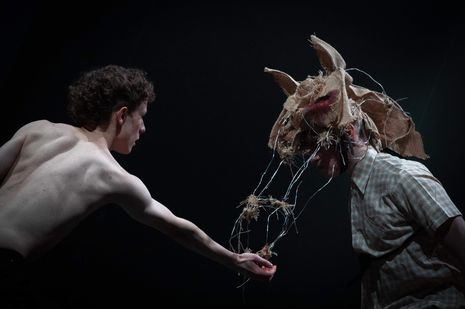Equus review: flashes of brilliance
Writer Stanley Lawson reviews a new take on Shaffer’s classic play

Peter Shaffer’s Equus is psychological deep dive into psychiatry, religion and sexuality. In the play, horses serve as both paraphilic loci and objects of ecstatic worship, while an emotionally desiccated doctor struggles to find purpose in his practice. It is therefore an extraordinarily demanding text to work with, especially for the actors playing the tortured adolescent patient Alan (Mark Jones) and the troubled and complex psychiatrist treating him, Dr Martin Dysart (Gregory Miller). Alan’s crime which lands him in Dysart’s care – the blinding of three horses in the stable where he works – is simply a means of launching into a much deeper and murky exploration of both patient and physician.
"The visceral horror and joy Jones blended in his performance was utterly captivating"
In addition to the challenging thematic intensity, Shaffer is a verbose playwright in his monologue writing, potentially leaving an actor plenty of rope with which to tie themselves in verbal knots with near repetition, impeding the pacing. Miller, however, largely evaded this problem with an energetic performance; his animated physicality and sense for the elements of dark comedy in the play meant he had the audience’s attention throughout. Despite this, it occasionally felt as though both Jones and Miller were battling to push through the text – Shaffer’s laughably grandiose monologues (the ones written for Dysart in particular) appear to be quite emotionally shallow when juxtaposed with the intense, breath-taking drama of the scenes between the two actors. I suspect it is principally not the actor's fault, but Shaffer’s, that the waxing lyrical about Doric columns and old gods was a little underwhelming when compared to the more pacey scenes of dialogue. These scenes, between him and his colleague Hester (Charlie Scott-Haynes) and the bulk of the scenes with Alan, gave Miller much more to work with and were where his skills as an actor were most evident.
"The play loses none of impact – still reaching its fingers into the audience’s psyche"
The scenes between Jones and Miller as patient and psychiatrist were electric and one of this production’s strengths – a high stakes game of truth-telling and secret-keeping, playing out with subtlety, regularly punctuated by moments of shock. Watching the relaxed, affable façade initially presented to Alan by Miller’s Dysart crumble as he becomes increasingly fixated on the unanswerable questions of his practice and increasingly entangled with Alan’s dangerously volatile psyche was compelling. Done slowly by degrees, Miller plays Dysart’s slide into despair as increasingly manic; beginning to mirror Jones’ jerky, crumpled physicality. The physical demands on Jones – making his debut on the ADC stage - as Alan were high and he met them with remarkable stamina. Though the conclusion of the play is striking, the standout sequence of this production actually fell in the middle; Jones and the ensemble performed an electric movement piece to accompany Alan’s recollection (or confession) of a late-night riding session with ‘Equus’ –the immutable horse-based god who haunts him. Body stripped to the waist and writhing, and his face twisted into a mask of tortured ecstasy, the visceral horror and joy Jones blended in his performance was utterly captivating. When paired with Miller’s voice leading him through the memory and the ensemble’s filling of the stage with energy, it made for a haunting moment. It was flashes of brilliance like these, passionately performed and cleverly staged, which pulled this production together.
Also deserving of praise is the prolific puppet master Dixie McDevitt, who created half a dozen wire headdresses with leathery coverings. Inhabited wonderfully by the cast, the mix of human and horse provides striking parallels to elements of the script concerning the unification of man and horse. Director Aoife Pallister Begadon has erred on the safer side of adaption in this production, but despite this, the play loses none of the impact – still reaching its fingers into the audience’s psyche. Equus is a major theatrical English work of the later 20th century, which has stood the test of times these last few decades. This production, staged faithfully to Shaffer’s intentions and text, stands as a testament to the enduring power of the play.
 News / Downing investigates ‘mysterious’ underground burial vault 29 December 2025
News / Downing investigates ‘mysterious’ underground burial vault 29 December 2025 Interviews / You don’t need to peak at Cambridge, says Robin Harding31 December 2025
Interviews / You don’t need to peak at Cambridge, says Robin Harding31 December 2025 News / Unions protest handling of redundancies at Epidemiology Unit30 December 2025
News / Unions protest handling of redundancies at Epidemiology Unit30 December 2025 Lifestyle / Ask Auntie Alice29 December 2025
Lifestyle / Ask Auntie Alice29 December 2025 Features / ‘Treated like we’re incompetent’: ents officers on college micromanagement30 December 2025
Features / ‘Treated like we’re incompetent’: ents officers on college micromanagement30 December 2025









